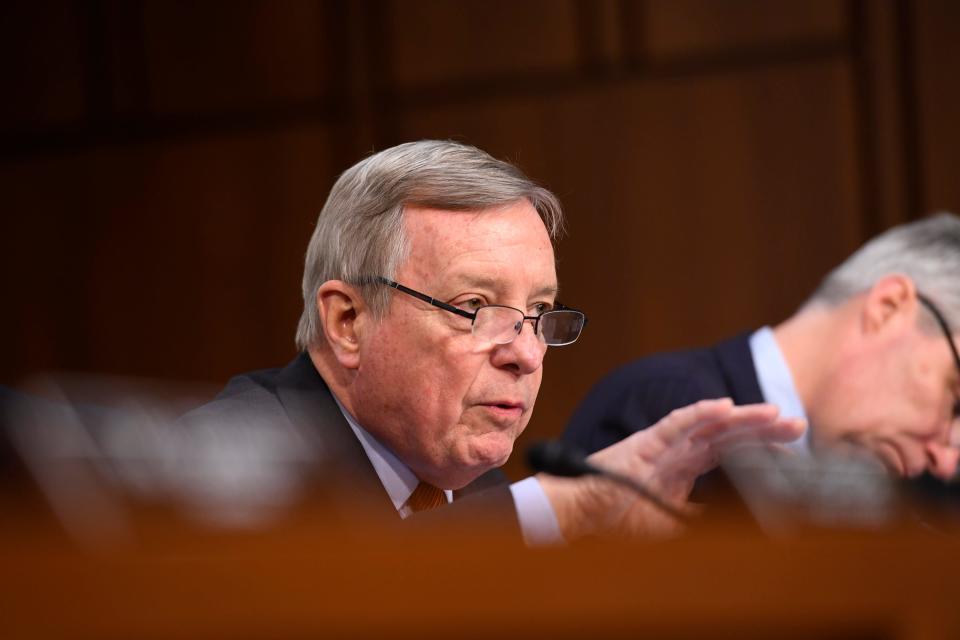First Step Act's implementation leaving too many men, women behind: Reader view
Our names are Brian Johnson and Lyle Jones Jr. and earlier this year, we were both released from federal prison through the First Step Act. Each of us served two decades of a life sentence. Neither of us had prior criminal records, nor was there any violence associated with our cases — and yet, we were sent off to federal prison with a sentence that meant we would spend the rest of our lives locked up, away from our families and communities.
Today, we are finally free. One of us was released from prison this summer, the other two months ago. We were granted releases because of the retroactive application of the Fair Sentencing Act, which allowed a judge to reevaluate our cases and our sentences related to crack cocaine.
Since then, we’ve reunited with family members and friends. But there are some friends and family we left behind when we walked out of prison.
With our newly granted freedom, we’re fighting for the people who are still incarcerated.
That’s why we traveled to Washington, D.C., last month with five other recently released men to attend a hearing on the First Step Act.

As members of the Senate Judiciary Committee pushed the Federal Bureau of Prisons and the Department of Justice to follow through on the promises of First Step (ensuring that incarcerated men and women are fairly released and not thrown back in prison), we wanted those in charge of the act's implementation to be able to look into the audience at people directly impacted by their decisions. We wanted them to consider us when determining how to ensure the fair application of First Step.
COLUMN: Society owes men and women in prison chance to return whole
Supporters of the act understand that shaving days, weeks, months and years off a prison sentence can mean the difference between cradling your grandchild for the first time or looking at a photocopied picture of her; holding your wife as she endures chemotherapy treatment for cancer or doing your best to console her over a 15-minute phone call; spending the holidays surrounded by good food and family members or sitting in isolation.
People who haven’t had these experiences, or heard from witnesses, underestimate the value of even a few weeks of freedom. Most can't fathom how it feels to wake up every morning in prison, with a life sentence hanging over your head and your heart.
It is this urgency for life and for freedom that we brought to the hearing.
Sen. Dick Durbin, a Democrat from Illinois, acknowledged one of the seven formerly incarcerated men who made the trip — Edward Douglas, a constituent of his who was recently released.
Good to catch up w/ Edward Douglas & his exceptional lawyer, MiAngel Cody, in DC today. Mr. Douglas received a life sentence that was triggered by two minor nonviolent drug convictions. After 16 years in prison, he became one of the first people released under the #FirstStepAct. pic.twitter.com/98TBp6enwk
— Senator Dick Durbin (@SenatorDurbin) November 19, 2019
In Durbin's words, “Edward and others who have joined us today are making our criminal justice system better and more just. It’s worth all of our time and effort it took to pass the First Step Act. I hope it will inspire all of us to search a little harder for bipartisan solutions.”
COLUMN: Jails disenfranchise thousands who have a constitutional right to vote
Douglas' influence on Durbin is an example of what happens when people closest to the problem get closer to lawmakers with the power to propose solutions. With our first few months of freedom, we are spending precious time away from family in an effort to influence the hearts and minds of complete strangers.
POLICING THE USA: A look at race, justice, media
The bill, which passed last year and which Durbin called, “one of the most important criminal justice reform laws in a generation” has brought home thousands of incarcerated individuals. But even more people would be granted the same chance at freedom if the Department of Justice and Bureau of Prisons quickly and effectively implemented the entirety of the law. They should start by getting more funding and programming into the prisons that need them most. Next, they should quickly and fairly implement the earned time credits and risk assessment systems to give as many people as possible the opportunity to earn their way toward freedom without the fear of re-incarceration.
We must ensure the First Step Act is implemented properly, but DOJ won't get on board. Instead of implementing required reforms, DOJ is resisting retroactive Fair Sentencing Act relief for eligible inmates & working to keep them behind bars. That’s just plain wrong. pic.twitter.com/RHAKu1Jqks
— Senator Dick Durbin (@SenatorDurbin) November 19, 2019
The question of what comes next weighs heavily on us, since we both know people behind bars who, by sheer chance, have not yet been granted the same opportunity for freedom that we have.
Brian Johnson; Baltimore, Md.
Lyle Jones Jr.; Bethlehem, Pa.
This article originally appeared on USA TODAY: First Step's unjust implementation leaving too many in prison: Readers

